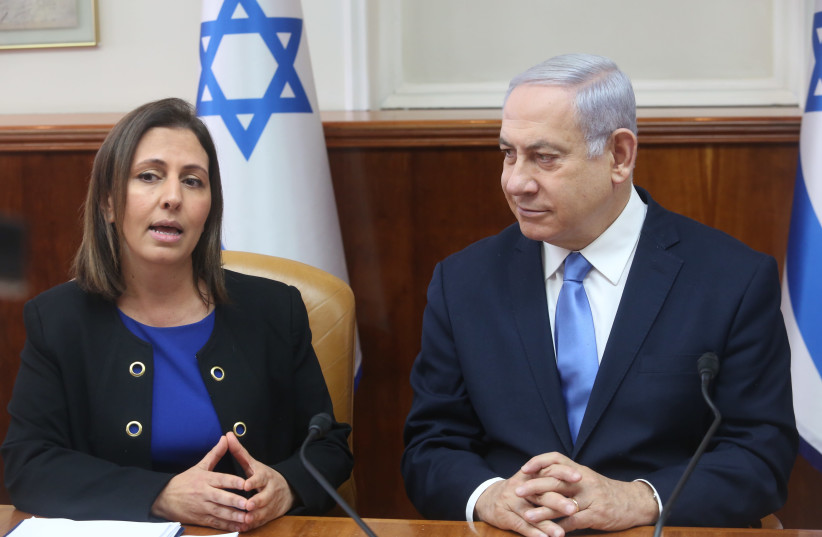Minister of Intelligence Gila Gamliel laid out her plan for the day after the war at a conference organized by the Sovereignty Movement, headed by Land of Israel activists Nadia Matar and Yehudit Katsover, in collaboration with the Yesha Council.
The conference, titled “Lessons from Gaza – an end to the idea of two states,” held at the Bible Lands Museum in Jerusalem last Thursday, focused mainly on opposition to the two-state solution to the Israeli-Palestinian conflict. Over 1,000 people attended the event, and roughly another 5,000 participated online. According to a poll presented at the conference, in the wake of the October 7 massacre, an overwhelming majority (74%) also said they were against a two-state solution; 20% were in favor, and 6% had no opinion.
The poll, conducted by Direct Polls Ltd. for the Sovereignty Movement a day ahead of the conference, also asked: “Are you for or against voluntary transfer emigration of the residents of the Gaza Strip to other countries?” A clear majority – 76% – responded in favor; 16% were against, and 8% had no opinion.
Surprisingly, center-left voters from the Yesh Atid and National Unity parties, headed by Opposition leader Yair Lapid and Minister Benny Gantz respectively, responded similarly regarding the issue. Among the Yesh Atid voters, 61% were in favor of the emigration, 24% were against, and 15% had no opinion. Among those who voted for Gantz’s party, 71% were in favor, 18% were against, and 11% had no opinion.

As for a return to the Israeli Gush Katif communities that were destroyed in 2005 during the disengagement from Gaza, the poll showed that 86% of voters for the right -wing Religious Zionist and Otzma Yehudit were in favor, as were 63% who voted for Prime Minister Benjamin Netanyahu’s Likud party and 83% of ultra-Orthodox Shas voters.
Intelligence Minister Gila Gamliel, a longtime supporter of sovereignty over all of Judea and Samaria, addressed the conference on the issue of voluntary emigration. Indeed, she had already announced her plan for “the day after” on Oct 13, less than a week after Hamas’s barbaric massacre of 1,200 Israelis in southern Israel and the kidnapping of 240 others.
“Now is the time that we must try new solutions,” she told the audience. “It is clear that much has to change if any conceptions were proven wrong on the day of the pogrom of October 7...
“Every time Israel retreated from territory, it became a base for terror and bloodshed,” she said, stressing that Iran – through its proxies, including Hamas – is responsible for all the terrorism and conflicts in the Middle East, “from Gaza to Lebanon to the Red Sea” and the suffering of tens of millions of people throughout the region, not only Israelis.
“Gaza has long been thought of as a problem without an answer. The greatest failure was the disengagement from Gaza,” she said. The State of Israel tried many solutions – enrichment, conflict management, and building high walls – in the hope of keeping the monsters of Hamas out of Israel. These have all failed.
“One of the issues on which my office has been working diligently is how to proceed the day after Hamas has been defeated and annihilated. We will still have about two million people, many of whom voted for Hamas and celebrated the massacre of innocent men, women, and children. Gaza is a breeding ground for extremism... Gaza is a place devoid of hope, stolen by the genocidal terrorists of Hamas, Islamic Jihad and other terrorist groups.”
‘Open the door’
Gamliel then referred to a recent article in the Guardian (UK) that described the hopelessness of the Palestinians in Gaza. “These people are desperate, and the international community, which claims to care about the Palestinians, sits by idly and watches. This is an opportunity,” she declared.
“Unfortunately, for the last 75 years, UNRWA (the United Nations Relief and Works Agency for Palestine Refugees) has done zero to help the Palestinian people even though it has an annual budget of well over one billion dollars,” she continued. “Instead of funneling money to rebuild Gaza or to the failed UNWRA, the international community can assist in the cost of humanitarian voluntary resettlement, helping the people of Gaza build new lives in their new host countries.
“I will make it simple by stating it in three simple words: Open the door.
“I say to the international community: No one is pushing or forcing anybody out, but surely you can’t be indifferent to their suffering. Just open the door and let those who wish it to join the hundreds of thousands of Gazans who have already left voluntarily in the last few years...
“It is an obligation of leadership to propose solutions and not just circle back to the same tired ideas and cliches,” she concluded.
A day earlier, in a video statement, Netanyahu said he wanted to “make a few points very clear.” First and foremost, “Israel has no intention of permanently occupying Gaza or displacing its civilian population.”
Matar told the Post that the need to make such a statement “shows that we are making a difference,” as Israelis are increasingly interested in voluntary emigration as a reasonable and humanitarian solution.
